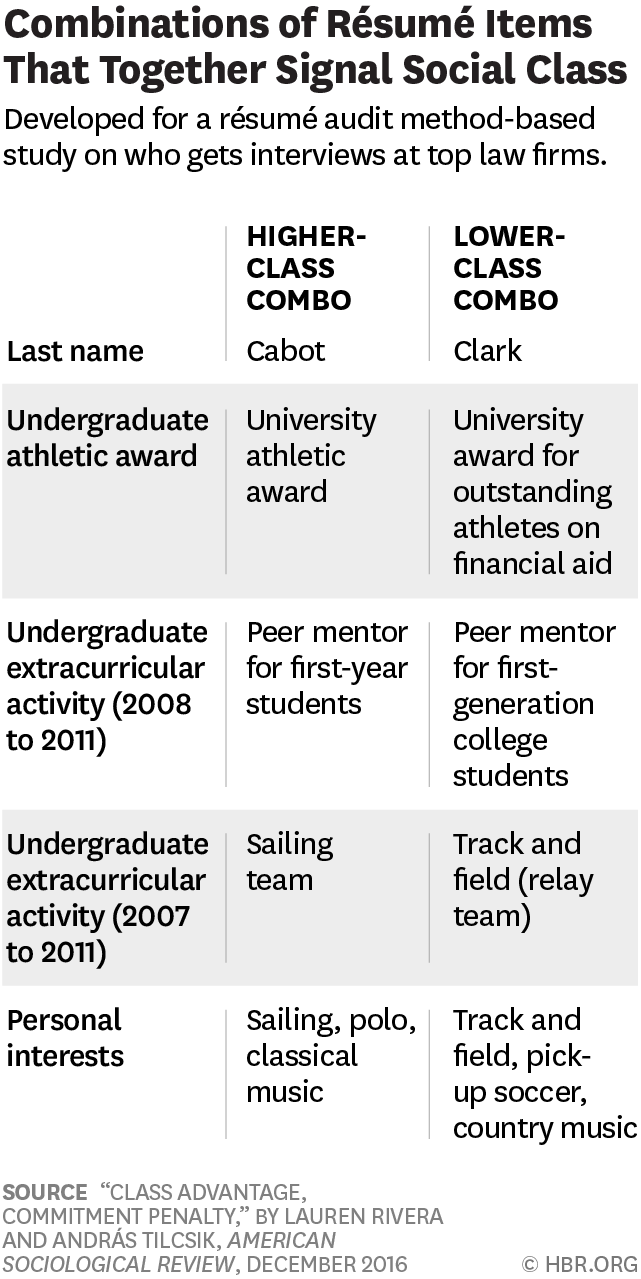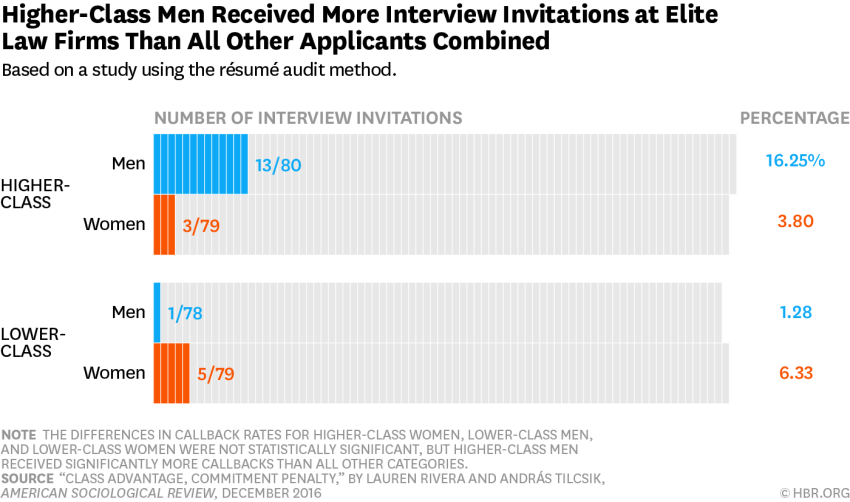
Jul 6, 2017 ● Randy Stancovici
Can employers determine your social class by looking at your resume?
This is a strange question, and one you may not have ever asked yourself when submitting a resume to prospective employers. Sure, you assume employers will size you up based on experience and college education. However, recent research has come out that suggests there is an additional factor that comes into play when employers are navigating through resumes: social class.
You might ask how employers can find out about something that isn't explicitly mentioned on a resume. Lauren Rivera, Professor at the Kellogg School of Management and contributor to Harvard Business Review, set out to answer this exact question. She analyzed the country's top law firms and came to a hypothesis: Everything else being held equal, people from elite backgrounds are more likely to get interviews than their less privileged counterparts. Every year, thousands of students apply for internships at these law firms. Their resumes are virtually equal. They have a good GPAs, great experience, and are on law review. Who gets the interview? That's where Lauren's research gets interesting.
Despite the fact that we would like to think people earn opportunities based on their own merit and hard work, it appears this isn't always the case. Based on prior research in the December 2016 issue of American Sociology Review, Lauren found that hiring in top professional services is indeed skewed towards higher class candidates. She conducted a field experiment using the resume audit method, which involves assigning different criteria to resumes and sending them out to employers to see the probability of the candidate being called back for an interview.
The question you may be asking is a good one: how do you identify social class on a resume? The answer is via extracurricular activities. Here is a breakdown of Lauren's resume items that she used in this field test:
 Can you identify which student is from a wealthier social class? Obviously, sailing, polo, and classical music are indicators of someone who has enjoyed a more privileged upbringing, whereas someone who is on track and field is less likely to be of that background. The important thing to note here is that all educational and work-related components are virtually the same. The candidates are equally qualified.
This is where the results get interesting.
Can you identify which student is from a wealthier social class? Obviously, sailing, polo, and classical music are indicators of someone who has enjoyed a more privileged upbringing, whereas someone who is on track and field is less likely to be of that background. The important thing to note here is that all educational and work-related components are virtually the same. The candidates are equally qualified.
This is where the results get interesting.
 Lauren found that employers highly favored higher-class men compared to the 3 other groups (higher-class women, lower-class women, lower-class men). Why did this happen? To explore the issue further, Lauren and her team conducted a follow-up experiment where they interviewed 210 additional attorneys from around the country, asking each attorney to evaluate the same resumes they used in their experiment. The results showed that they favored interviewing higher-class men above all other candidates.
The interesting thing about this follow-up study is that Lauren and her team were able to find out why. The attorneys saw higher-class candidates of either gender as being bitter fits for the culture and clientele of large law firms. Interestingly enough, even though higher-class women were seen as good fits, they were rejected because the attorneys believed they would be the least committed to the job of any group. They cited family as being the primary reason a higher-class woman would ditch the job. Overall, the attorneys just didn't want to take the risk.
These findings tell us that despite our national myth of "hard work pays off," there are additional factors that come into play. The social class people grow up in can greatly determine what kind of jobs and salaries they are able to obtain. While there is no simple solution to inherent bias favoring affluent men, steps can be taken to mitigate the bias as much as possible. Getting rid of the requirement to list extracurriculars and reducing names to initials are just a few of the important first steps that could make a huge difference when resumes are being screened—and could eventually give everyone a truly equal opportunity.
Lauren found that employers highly favored higher-class men compared to the 3 other groups (higher-class women, lower-class women, lower-class men). Why did this happen? To explore the issue further, Lauren and her team conducted a follow-up experiment where they interviewed 210 additional attorneys from around the country, asking each attorney to evaluate the same resumes they used in their experiment. The results showed that they favored interviewing higher-class men above all other candidates.
The interesting thing about this follow-up study is that Lauren and her team were able to find out why. The attorneys saw higher-class candidates of either gender as being bitter fits for the culture and clientele of large law firms. Interestingly enough, even though higher-class women were seen as good fits, they were rejected because the attorneys believed they would be the least committed to the job of any group. They cited family as being the primary reason a higher-class woman would ditch the job. Overall, the attorneys just didn't want to take the risk.
These findings tell us that despite our national myth of "hard work pays off," there are additional factors that come into play. The social class people grow up in can greatly determine what kind of jobs and salaries they are able to obtain. While there is no simple solution to inherent bias favoring affluent men, steps can be taken to mitigate the bias as much as possible. Getting rid of the requirement to list extracurriculars and reducing names to initials are just a few of the important first steps that could make a huge difference when resumes are being screened—and could eventually give everyone a truly equal opportunity.
 Can you identify which student is from a wealthier social class? Obviously, sailing, polo, and classical music are indicators of someone who has enjoyed a more privileged upbringing, whereas someone who is on track and field is less likely to be of that background. The important thing to note here is that all educational and work-related components are virtually the same. The candidates are equally qualified.
This is where the results get interesting.
Can you identify which student is from a wealthier social class? Obviously, sailing, polo, and classical music are indicators of someone who has enjoyed a more privileged upbringing, whereas someone who is on track and field is less likely to be of that background. The important thing to note here is that all educational and work-related components are virtually the same. The candidates are equally qualified.
This is where the results get interesting.
 Lauren found that employers highly favored higher-class men compared to the 3 other groups (higher-class women, lower-class women, lower-class men). Why did this happen? To explore the issue further, Lauren and her team conducted a follow-up experiment where they interviewed 210 additional attorneys from around the country, asking each attorney to evaluate the same resumes they used in their experiment. The results showed that they favored interviewing higher-class men above all other candidates.
The interesting thing about this follow-up study is that Lauren and her team were able to find out why. The attorneys saw higher-class candidates of either gender as being bitter fits for the culture and clientele of large law firms. Interestingly enough, even though higher-class women were seen as good fits, they were rejected because the attorneys believed they would be the least committed to the job of any group. They cited family as being the primary reason a higher-class woman would ditch the job. Overall, the attorneys just didn't want to take the risk.
These findings tell us that despite our national myth of "hard work pays off," there are additional factors that come into play. The social class people grow up in can greatly determine what kind of jobs and salaries they are able to obtain. While there is no simple solution to inherent bias favoring affluent men, steps can be taken to mitigate the bias as much as possible. Getting rid of the requirement to list extracurriculars and reducing names to initials are just a few of the important first steps that could make a huge difference when resumes are being screened—and could eventually give everyone a truly equal opportunity.
Lauren found that employers highly favored higher-class men compared to the 3 other groups (higher-class women, lower-class women, lower-class men). Why did this happen? To explore the issue further, Lauren and her team conducted a follow-up experiment where they interviewed 210 additional attorneys from around the country, asking each attorney to evaluate the same resumes they used in their experiment. The results showed that they favored interviewing higher-class men above all other candidates.
The interesting thing about this follow-up study is that Lauren and her team were able to find out why. The attorneys saw higher-class candidates of either gender as being bitter fits for the culture and clientele of large law firms. Interestingly enough, even though higher-class women were seen as good fits, they were rejected because the attorneys believed they would be the least committed to the job of any group. They cited family as being the primary reason a higher-class woman would ditch the job. Overall, the attorneys just didn't want to take the risk.
These findings tell us that despite our national myth of "hard work pays off," there are additional factors that come into play. The social class people grow up in can greatly determine what kind of jobs and salaries they are able to obtain. While there is no simple solution to inherent bias favoring affluent men, steps can be taken to mitigate the bias as much as possible. Getting rid of the requirement to list extracurriculars and reducing names to initials are just a few of the important first steps that could make a huge difference when resumes are being screened—and could eventually give everyone a truly equal opportunity.

